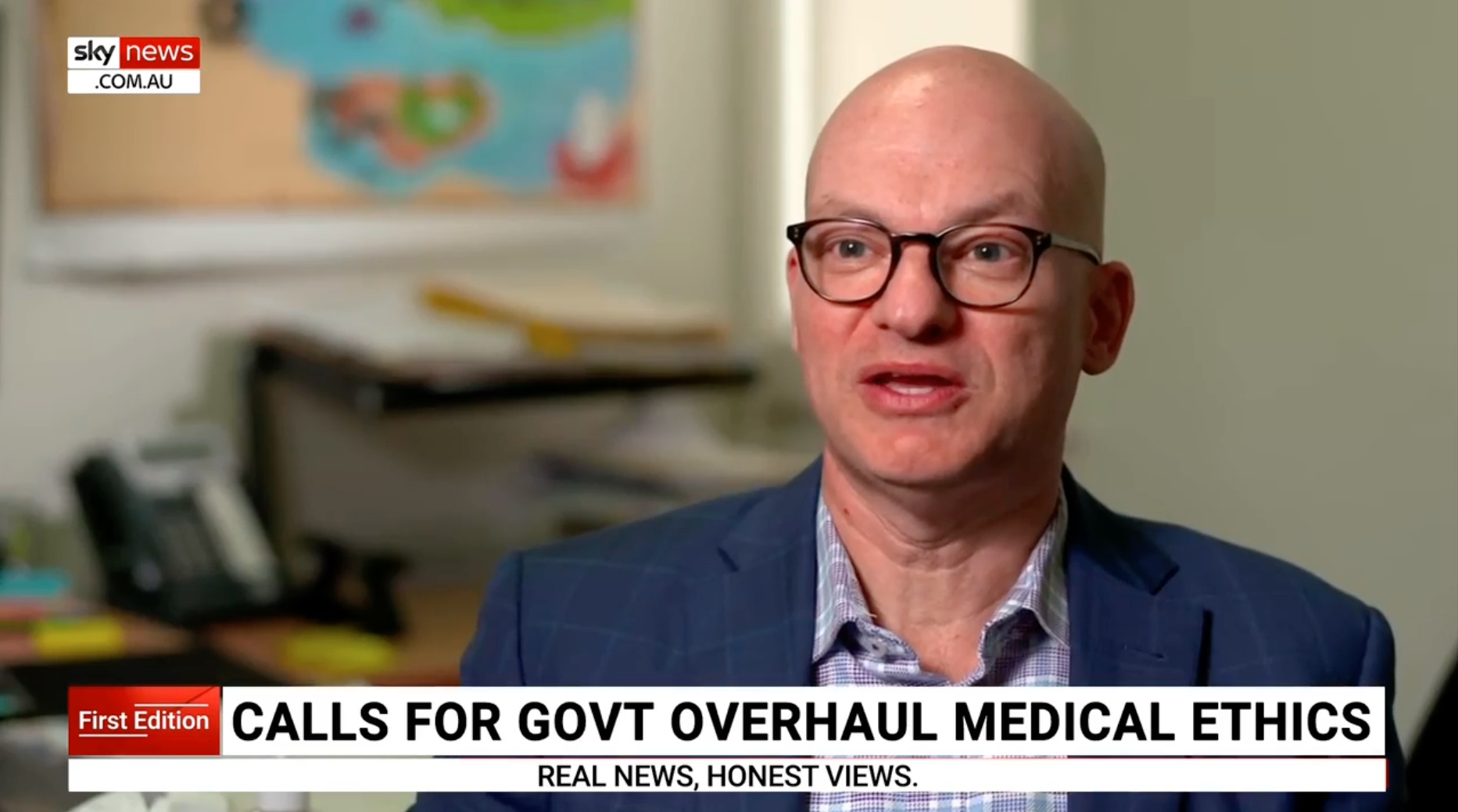Dr Gary Galambos Urges the Regulators to Return to the Hippocratic Oath to Safeguard the Doctor-Patient Therapeutic Relationship - Not Bureaucracy
Dr Gary Galambos recently appeared on Sky News to discuss preserving the therapeutic relationship between doctors and patients.
Speaking with Taylor Auerbach, the Investigations Producer at Sky News, Dr Galambos explored the evolution of Australia's medical ethics guidelines - calling for a return to the time-honoured principles of the Hippocratic Oath.
"We love the Hippocratic Oath...it is 2,500 years that doctors have been pledging an oath to care for their patients, prioritise their patients, and do them no harm," Dr Galambos begins.

The Hippocratic Oath is a traditional pledge among medical professionals, tracing back to Hippocrates and Ancient Greek medical literature. With a history dating back to 400 BC, the Oath achieved universal recognition in the early 19th century (Indla & Radhika, 2020). It has since been adapted to suit the profession in the modern era.
"[The Hippocratic Oath] required a new physician to swear upon a number of healing gods that he will uphold a number of professional, ethical standards," the National Library of Medicine website reads.
At its inception, the Hippocratic Oath reflected a simpler dynamic in medicine: the existence of a "tripartite relationship" between the patient, physician, and illness (Indla & Radhika, 2020).
However, things have changed since the days of Hippocrates.
While certain interventions, such as universal health insurance, play a crucial role in ensuring the safety of patients, some have encroached upon a physician's autonomy in treatment. For instance, Dr Galambos has warned against the entry of US-style managed care in Australia, over concerns that it replaces patient-centric, trauma-informed healthcare with its homogenised, impersonal and corporatised model.
US-style managed care bills itself as a healthcare delivery model that controls expenses while preserving the quality of clinical care. Health Management Organisations (HMOs) are the primary conduit between patients and a specific network of healthcare services and sit at the core of a managed care system.
These HMOs pay providers a fixed amount per patient. As a result, managed care fosters a system that incentivises cost-effective care, often at the expense of patient outcomes. Ultimately, this approach has proven to be relatively unsuccessful in the United States - a higher percentage of GDP is spent on healthcare compared to other OECD countries, yet many Americans have limited access to healthcare services.
In his conversation with Dr Galambos, Auerbach points to a change in Australian medical ethics that may hasten the widespread implementation of managed care.
Referencing new medical guidelines endorsed in May 2020, Auerbach raises concerns about overregulating medical practice. There is fear that the pursuit of bureaucratic compliance might overshadow the fundamental principles of the Hippocratic Oath - specifically in prioritising the patient and "doing no harm."
"If doctors feel they are obliged to follow some committee-led code and tick box exercise, they will be distracted from the needs of their patient," Dr Galambos tells Auerbach.
While regulatory bodies must uphold standards of good medical practice, implementing a 27-page set of bureaucratic requirements falls short of ensuring positive clinical outcomes. Beyond imposing such rules, these bodies should actively educate medical professionals, teaching them to recognise and address socio-cultural factors influencing the patient's needs.
This is not to say that regulation isn’t important; it is necessary, especially in rare circumstances where medical practitioners overlook treatments and relevant social factors that impact a patient. However, imposing even well-intentioned protocols on clinicians can inadvertently undermine person-centred care and, by extension, the Hippocratic oath.
"I'm concerned about the future of medicine..." Dr Galambos continues. "[I am concerned that this bureaucratic culture] is affecting whether doctors are even willing to enter hospital-type environments where these practices have reached extreme levels."
As patient-centred care takes a backseat and bureaucracy increases, the Australian healthcare system becomes vulnerable to managed care.
Within this model, the healthcare system becomes a highly-regulated environment. Medical professionals find themselves tethered to a network's referral base and the treatments offered within them. This puts conditions on the approach to treatment before a consultation even takes place.
While not as stringent, the 2020 regulations do a similar thing - forcing doctors to comply with certain expectations before establishing a therapeutic bond with a patient. As Dr Galambos writes in a LinkedIn post: "It defeats the purpose of what needs to be a trusting, safe and collaborative relationship to force me to impose those rules, regulations and policies on the patient myself."
Focusing on bureaucratic compliance can also lead to a potential compromise of patient confidentiality - a vital principle of the Hippocratic Oath. When regulations become too harsh and specific, there is a risk that healthcare professionals may prioritise avoiding penalties over safeguarding patient privacy.
Normalising the exchange of patient data heightens the vulnerability of the Australian healthcare system to managed care. Under this model, specialists and buying groups often exchange patient data. While this may be intended to improve patient care, it often results in disclosing sensitive and previously confidential information about a patient's situation.
As the founder of the digital mental health literacy platform MindSkiller®, Dr Galambos has spent years working to protect patient data. As a social-good enterprise owned by clinicians, MindSkiller® works to protect patient privacy, optimise care pathways and prioritise what is in the patient's best interest - rather than emphasising an efficient and overregulated approach to mental health care.
Watch Dr Galambos' full interview via Sky News .
Sources:
https://www.skynews.com.au/lifestyle/health/federal-government-urged-to-remove-red-tape-and-overhaul-medical-ethics/video/cf3965b1b6947c363bc575cb5762bad2
https://www.skynews.com.au/lifestyle/health/doctors-demand-overhaul-of-australias-medical-ethics-guidelines-over-new-woke-set-of-codes-arguing-for-return-to-hippocratic-oath/news-story/fe5f2f49fcd0e192e40e2952144beb04#share-tools
https://www.medicalboard.gov.au/Codes-Guidelines-Policies/Code-of-conduct.aspx
https://www.ncbi.nlm.nih.gov/pmc/articles/PMC6482690/#:~:text=The%20oath%20has%20been%20in,no%20laws%20or%20litigations%20existed
https://www.nlm.nih.gov/hmd/topics/greek-medicine/index.html#case1 https://www.drgarygalambos.com/blog/post/dr-gary-galambos-opposes-honeysuckle-health-nib-buying-group
